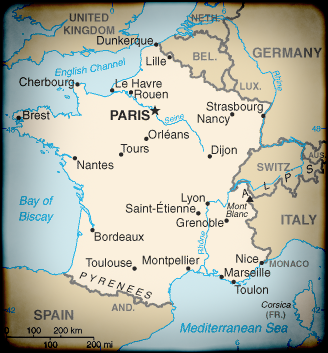There is an important distinction that is made in schools of realistic philosophy between idea and reality. The distinction is very helpful in every day life: "Does he love you or the idea of you or, better (or worse!), just the idea of being in relationship?" "Do you really like marketing or do you like the idea of being in a marketing firm in a big city?" The applications are many.
The distinction can also be helpful in wading through the multi-faceted issue of immigration. A recent "controversy" in France, reported in the Wall Street Journal, precisely beckons making the distinction, the distinction between the idea of immigration and the reality of immigration.

In my estimation, recent protests by Parisian high-school students were largely animated by the idea of immigration. The idea of immigration carries with it ideas of united universal human family and generosity and open-mindedness and justice. The reality of immigration is far more complex and requires nuancing that the idea does not. The reality carries with it the realities of local community and order and justice in the concrete.
"The case of 15-year-old Leonarda Dibrani, who was detained by police during a school field trip on Oct. 9 and deported to Kosovo along with the rest of her family, has sparked a national debate in France." And, as the article states, "the dilemma centers on how far a country, particularly one that considers itself a champion of human rights, should go in confronting illegal immigration". It is precisely here that we see the intersection between idea and reality. Human rights are broad ideas regarding all human beings, broad ideas regarding the global community. These ideas are not without foundation. Human beings are human beings, and their commonality is more fundamental than any cultural diversity, and translates into basic universal rights – that is, rights for all. But these rights must translate concretely, into reality; and the reality on the ground in our world is that people are more immediately members of sub-communities called nations. And it is real-ly in this real-ity, local real-ity, that people live. This national/local reality takes precedence over what is happening "abroad" – not selfishly, but real-istically. One deals more concretely, more "everyday-ly", with what is happening down the street than with what is happening in Bangladesh. And, consequently, one owes primary allegiance to those who are down the street, with whom one forms real community, than to persons in Bangladesh, with whom one forms community largely in idea.
The reality of national/local community explains the reaction of the French people to this controversy. A survey by French pollster BVA showed that, despite the loud shouts of the protestors calling for his resignation, Interior Minister Manuel Valls remains popular, with 74 percent approving of his handling of the deportation. Xenophobia and selfish nationalism or real-istic reaction to an immigration situation which is not being addressed, and which leaves the French people concerned with the gradual disappearance of their cultural patrimony to which they have a right? One can argue the latter. Indeed, President Hollande's generally strict stance on immigration "has won strong support among a French public that blames illegal immigrants for a perceived erosion of France's social fabric."
The issue is indeed not being addressed adequately. France's daily Le Monde accused Mr. Hollande of trying to avoid "the complexities of France's debate on immigration with a hollow gesture. 'Can he hope to put out this fire? Undoubtedly, no. Because his partial, circumstantial remarks skirt the real issues at the heart of this affair.'"
President Hollande finds himself caught between a rock and a hard place: wishing to maintain his stance on immigration and to acknowledge the will of the majority and wishing to show good will reflecting French generosity. Mr. Hollande opted to enforce the law regarding the illegal immigration of the Dibrani family by maintaining the deportation, but invited Leonarda to return to continue her schooling. Leonarda declined the invitation, claiming that "Mr. Hollande is without a heart" because he did not invite the entire family to return. A rock and a hard place. Occasional gestures of mercy such as President Hollande's invitation to Leonarda, gestures that supersede the law, have their place. However, as much as one may wish, mercy does not solve the issue, for mercy does not establish order, which is necessary for the peaceful functioning of community. The issue remains.
